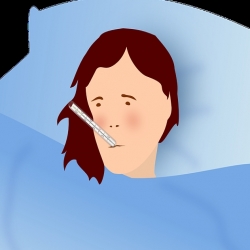Cold and Flu
 Natural cures for Cold and Flu
Natural cures for Cold and Flu
These are both respiratory diseases caused by different viruses. They are often associated with each other since they have similar symptoms. You may say you have a cold when in reality you have flu and vice versa. Only a medical test can confirm the type of virus causing the flu or the cold, however the fact that the symptoms of a cold are often milder compared to flu, can help us differentiate them. These are illnesses frequent in cold, snowy and rainy weathers. They are contagious since they are airborne, and can spread via direct or indirect contact. Major preventive measures include proper hygiene and keeping warm in cold season.
What are the causes of cold and flu?
More than 200 viruses are implicated in the cause of colds, rhinoviruses being the most common cause. They spread in air and can be contracted by being in contact with an infected person or touching contaminated surfaces. Since microorganisms that cause infections cannot be seen with naked eyes, one cannot tell whether a surface is contaminated or not. Usually rubbing the nose or touching the mouth after being in contact with a contaminated object or person can give the virus access to the respiratory tract. Picornavirus and human coronavirus also cause common colds. Flu is caused by influenza virus. The types of influenza viruses are type A, B and C.
What are the symptoms?
Fever, headache, muscle aches throughout the body, weakness, fatigue and drowsiness. Runny nose or congested nostrils, sneezing and coughing. Irritation in eyes causing them to itch and redden, sore and dry throat, sensation of facial pressure or heaviness. Loss of appetite, diarrhoea and abdominal pain if symptoms worsen.
Natural cures for cold and flu
-Keep warm and get plenty of rest. Sleeping helps boost the body's immune system.
-Hydration: drink plenty water, herbal tea such as ginger and green tea. Try fresh fruit juices, they contain vitamin C.
-Epsom salt: add to your bath water and soak your body. This will help you relax and soothe your aching muscles. Do this preferably bed fore bed time.
-Salt, water and lemon juice: add half a teaspoon to a cup of warm water and gargle. Or you can use lemon juice instead. Squeeze fresh lemon, a tablespoon full into a cup of water and gargle. Do this 5 times a day.
-chicken soup: is very effective in decongesting a stuffy nose. Have three cups a day. You can also add garlic to maximize the effects of the soup, since garlic is known to fight infections.
-Stock up on your supplements: vitamin C, vitamin D, zinc and omega3. They boost the immune system, choose one of the supplements. The rest you can get from food. Do not take all of them at once.
-Garlic: chew one or two fresh garlic cloves and drink water after.
-Peppermint and Eucalyptus oil: add three drops of one of these oils to boiled water. Inhale the steam effectively by draping a small blanket or towel over your head and lean into the pot or bowl of water. Keep your eyes closed at all times. This helps with relaxation, relieving facial pressure and nasal congestion. Do this once, preferably before bed. You also dap eucalyptus oil under the nose using cotton. Do not attempt to put inside the nostrils.
-Honey: mix 2 tablespoons of raw honey with a teaspoon of cinnamon and coconut oil. Eat this once a day.
-extra tips: have steamy showers, use an extra pillow when you sleep, blow your nose gently, avoid sniffing phlegm back, warm compresses on the head can also help.